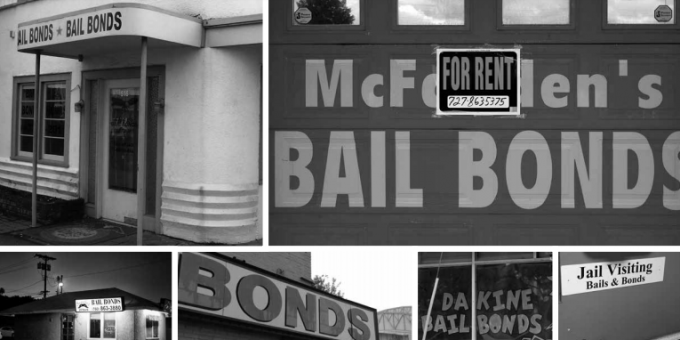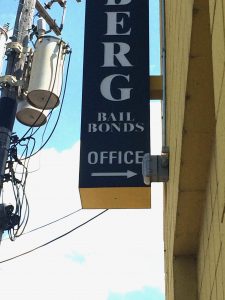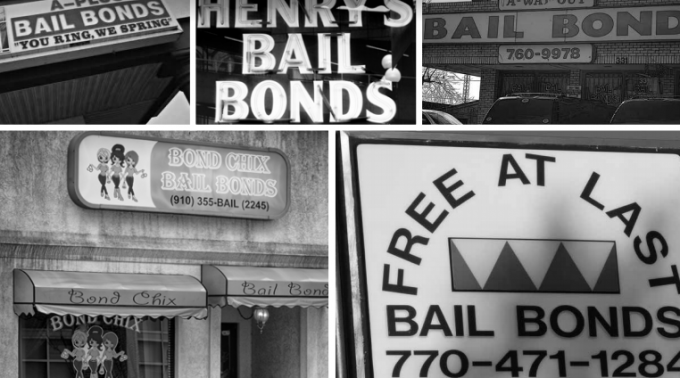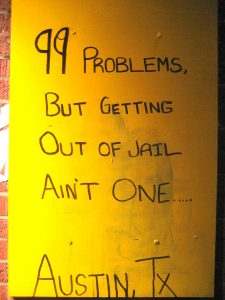
Photos via Flickr CC (Daniel Oines, Dakine Kane, Roy Luck, Robert W. Howington) and Josh Page
Desperation and Service in the Bail Industry
I cold-called Bettie.* Her son, Terrance, had a warrant for a serious crime, and he had turned himself in to the local jail. I’d called Bettie on behalf of “A-Team Bail Bonds,” hoping to land a bond. Bettie seemed relieved that I’d called and didn’t question how I got her number (agents use a database to find contact information for family of people in jail). With an anxious tone, she grasped for information: How did the pretrial process work? Would the judge lower the bail since Terrance turned himself in? I provided what little information I could, and we made a plan: she’d come to the office the next day, and I’d walk her to court, sit with her, and explain the proceedings and her options. Bettie seemed comforted.
About an hour later, Bettie called the office asking for me. She’d been watching the local news, and her son’s photo had flashed on the screen. Incredulous, Bettie and her daughter decided they should call me. I speculated: reporters must have gotten wind of his arrest, and since the charges were serious, it made for a story. Bettie seemed confused and despondent as she described the circumstances of the alleged crime and told me about her son’s background. She wondered what would happen if Terrance was convicted. Again, I provided what little I knew and assured her we’d know more in court. Bettie thanked me for my help.

I had a lot of expectations when I began my fieldwork as a bail bond agent in a large, urban county I call Rocksville. But in an industry that makes its profits by extracting about $2 billion a year from some of America’s most disadvantaged families, I hadn’t expected gratitude.
To be honest, I suspected clients would be resentful about forking over money, providing extensive personal information on bail applications, and agreeing to monitoring, even though defendants hadn’t been convicted of anything. And many clients were resentful, but a significant number also expressed clear appreciation.
My co-workers didn’t find this puzzling in the least. In their eyes, commercial bail agents were obviously invaluable service providers, a fact that merited some professional pride even though they were fully aware that service was entwined with aggressive, sometimes predatory profit-seeking. A seasoned co-worker suggested Bond Chasers as a title for a book based on my research, because, he said, we hustled business like “ambulance-chasing” lawyers.
As I became a full-fledged agent, I, too, came to see that bond companies offered a range of services to defendants and their friends and family members. As a sociologist, however, I could never fully adopt the other agents’ view that all of this was obvious, natural, and uninteresting. So I began to ask myself what political choices, legal practices, and criminal justice operations made A-Team’s myriad services necessary in the first place. Gradually, I came to understand how our services—and the gratitude they often elicited—were products of a system whose normal operations routinely failed our customers. Lacking other sources of information and support, desperate clients appreciated and sometimes even clung to the agents who were willing to help them out—even though they also knew that bondpersons were trying to “close a deal” that would cost them considerably.
american bail

The U.S. is one of only two nations with commercial bail bonds—the other is the Philippines. In this system, after arrest, the court either releases individuals on their own recognizance or requires them to post monetary bail to insure that they will show for scheduled court appearances. Since most defendants cannot afford the full amount of their bail, they enlist a bail company’s assistance. This private company charges a premium (typically 10% of the bail) and co-signers assume responsibility for ensuring the defendant makes it to court. Should the accused fail to appear, the court, in theory, moves to collect the full amount of the bail from the company. The bail company attempts to return the defendant to custody, sometimes using “bounty hunters”; failing that, it works to recoup the full amount of the bail from the bond’s co-signers.
Along with nearly every other country, a handful of U.S. states (Illinois, Kentucky, Massachusetts, Oregon, and Wisconsin), the District of Columbia, and the federal government do not compel defendants to pay non-refundable premiums to get out of jail. Instead, they use a combination of other techniques, such as having arrestees deposit money with the court that they get back—minus fines and fees—at the end of their case; charging defendants with new crimes for not showing up for court; denying release on bail (that is, pre-trial detention); requiring payment of bail for missing court; or mandating conditions of release, such as wearing an electronic monitor, checking in with court staff, or adhering to a curfew.
In recent decades, the penal system and commercial bail have grown together—and quickly. It is estimated that 450,000 people (two-thirds of the total jail population) are non-convicted defendants. The vast majority—roughly five out of six—are behind bars because they cannot afford bail, bond companies refuse to bail them out, or the court will not allow them to post bail because of probation or parole violations, mandatory in-custody drug assessments, or other legal matters. Meanwhile, an estimated 14,000 U.S. commercial bail agents secure the release of more than two million defendants annually. Bail is now the dominant method for obtaining pretrial release (surpassing release on recognizance in 1998) and bail amounts set by judges have risen steadily.Critics—including the American Bar Foundation and National District Attorneys Association—argue that for-profit bail contributes to a “two-tiered” justice that harms poor people. Keeping people in jail because they cannot afford bail contributes to jail crowding and drains municipal coffers, while non-refundable bail premiums function as pre-conviction punishment for those who can afford to get bailed out. Critics push, instead, for eliminating commercial bail and moving toward a combination of risk assessments and non-monetary conditions for release, like drug tests and check-ins with pre-trial staff, to try to ensure defendants show up for court and avoid criminal activity while on release.
Defenders of commercial bail—most often bail agents, companies, and the professional groups that represent them—acknowledge that the industry’s central aim is to make money. They describe it as a system that harnesses the profit motive and uses the dynamic energies of the free market to benefit taxpayers. Unlike publicly funded probation departments or pretrial agencies, they argue, bail companies manage defendants at no cost to counties. Going a step further, industry advocates like Dan Barto, a bail agent in Virginia who self-published an account of his experiences, maintain that bondspersons perform important services for those caught up in the pre-trial process:
I can say that in the several years I’ve been writing bonds, most bonding agents, myself included, derive satisfaction in helping people get through this legal process. We provide a service to people. While there may be some bondsmen who care only about the money, there are many who take pride in performing this service well.
On the surface, this may read as a simple claim for professional dignity. After all, bail agents are stigmatized in the legal field; judges, lawyers, and court staff typically do not view them as part of the courtroom workgroup. They are private actors who serve a legal purpose (getting people out of jail) but are not part of “the team.” And popular depictions of bail bonds often highlight corruption, exploitation, and macho exploits (think Dog the Bounty Hunter). In response, bail agents insist that they are professional service providers. And though this “service discourse” is deployed to defend and promote commercial bail, it isn’t wholly lip service; it reflects, as I learned in my fieldwork, something real about bail agents’ daily work experience.

exceeding low expectations
I worked at A-Team for a little over a year. It was (and is) a well-managed, successful company. As a bondsman, I engaged in the same activities as my co-workers: I solicited business at court, worked daytime and nighttime desk shifts, posted bonds at courthouses throughout the state, developed relationships with attorneys, attended company parties, checked warrants, and followed up with defendants who missed court or did not make payments. I did not engage in “fugitive recovery”—the company contracted with freelance bounty hunters if needed. In fact, we rarely monitored clients after bailing them out. The company sent text message and email reminders about court dates to defendants and their co-signers (A-Team requires that every bail have at least one co-signer).
In the course of my research, I learned that agents routinely offer various forms of assistance for low-income customers, primarily poor people of color. It’s very difficult for those with limited resources to get information, much less support, from overburdened jails, courts, or related institutions. Lacking attentive private attorneys, therefore, desperate defendants and their friends and families turn to bail companies to help them understand and navigate the opaque, confusing legal processes. And agents, desperate for business in a cutthroat industry, leverage clients’ unmet needs for information and support to get a leg up on the competition. What’s more, through engaging service activities (and invoking the service discourse) bondspersons imbue the job with meaning and construct it as morally right.Holding the keys to the jail for defendants who can’t afford bail, agents provide a much needed and appreciated service. But it would be a mistake to imagine that clients are grateful only because of the freedom that agents make possible. Defendants and their friends and family recognize that they receive—and depend on—a much broader array of badly needed services.
In fact, even when people have gone through it before, the pretrial process can be murky and intimidating. It can appear especially impenetrable to defendants’ family and friends. And bondspersons work primarily with these people, not the defendants. They are responsible for coming up with money for premiums and co-signing bail agreements. With only a vague familiarity with the legal process, they are often starved for information.
Although the types of information agents provide vary, there are common topics: along with walking clients through the legal process, agents explain the differences between public and private attorneys and the relative merits of each. Discussions regularly turn to the defendant’s case: Is the alleged victim pressing charges? Will the case move forward if he or she does not? When is the next court date? If convicted, what’s the likely punishment? Any chance the charges will get dropped?Worried about the defendant, family and friends also inquire about jail conditions. Will jail staff give the person his or her meds? Is jail dangerous? What’s the food like? When are visiting hours and what’s the process for putting money on the inmate’s books? Defendants’ close relations are often eager to discuss the person in jail and their relationship; they express frustration because their loved one won’t kick an addiction, leave a troublesome relationship, or find steady work. Perhaps this time they’ll “get their shit together.” Agents regularly become sounding boards as people—usually women, some of whom want to extricate themselves from difficult relationships with the accused—contemplate the thorny, often emotional decision to take responsibility for a defendant’s bond and the defendant. In these exchanges, agents try to establish trust and goodwill that may result in a bond, whether now or in the future. Moreover, by establishing rapport with co-signers, agents hope these contacts will help them track down defendants who might skip court or miss payments.
Agents also offer their services in court. In Rocksville, bondspersons attend first appearance hearings for people charged with gross misdemeanor and felony crimes. Before and during court proceedings, they try to drum up business by offering assistance. They direct the accused’s relations to the correct courtroom, instruct them to check in with the public defender (so the attorney can note their presence when attesting to defendants’ community connections, a factor judges consider in bail rulings), translate court-speak, and discuss options regarding bail. And if they have a prospective client, like Terrance (described above), agents will accompany friends and family to court, hoping to land a bond, as I did with Bettie. In short, bondspersons strategically create opportunities to stand out as well-informed guides. Even if this strategy doesn’t lead to immediate business, agents hope that court contacts will think of them if they—or someone they know—ever needs a bond.
Court and jail operations also create openings for agents to position themselves as service providers. The system of jail phone calls, in particular, compels inmates to seek agents’ help. Jails contract with for-profit telephone companies (for example, Global Tel-Link and Securus Technologies) that charge exorbitant fees for inmate calls. Commonly, the phone companies provide a portion of their profits from these calls to local and state governments. Defendants must pay for calls using money that’s “on their books” or otherwise have people on the outside finance their phone use. Bail companies, though, establish per-call contracts with the telephone companies so that jail inmates can call their offices for free. Typically, defendants call and provide contact information for people who might pay for their bail and/or co-sign for it.Along with lining up bail, jail inmates also call bond companies for updates on their case—generally, if they have been charged with a crime (the court has several days to charge or release inmates) and whether they have “holds” preventing them from getting bailed out (usually because of warrants in other counties or probation or parole violations). More often, they called hoping we could connect them with, or send a message to, people outside of jail who could put money into their jail accounts, visit, inform employers of their situation, pay bills, and handle other everyday affairs. My colleagues and I generally helped with these requests if we thought there was a possibility of landing a bond. Some detainees would work out mutually beneficial arrangements with bail agents; acting as “jail runners,” they would recruit business for agents inside of the jail in exchange for assistance communicating with family and friends.
If and when defendants bail out of jail, they may look to agents for additional aid. In a classic 1975 study, sociologist Forrest Dill argued:
One of the key functions performed by attorneys in the criminal process is to direct the passage of cases through the procedural and bureaucratic mazes of the court system. For unrepresented defendants, however, the bondsman may perform the crucial institutional task of helping to negotiate court routines.
Dill’s observation still rings true: bail agents and administrative staff (at least in Rocksville) act as legal guides for defendants who do not have private attorneys—and at times they provide this help to defendants with inattentive hired counsel. They provide information about court dates and locations, check the status of warrants, contact court staff on defendants’ behalf (especially when the accused have missed court or are at risk of doing so), and, at times, drive defendants to their court dates. These activities help clients show up for court, thereby protecting the company’s investments. Also, A-Team employees believe these practices produce positive impressions among defendants, leading to future business from “repeat customers” and referrals.
service denied and anger at the system
Still, many people who have used (or tried to use) bail companies would balk at the idea that the businesses are service providers deserving of their gratitude. As I expected when I started working as an agent, some clients resented us and saw the arrangement as exploitative. Others expressed frustration or anger when we denied them services or perceived that we were trying to manipulate them.
At A-Team, we rejected requests for help if defendants had a history of missing court, didn’t have money to post bail, or couldn’t round up co-signers. Defendant and co-signer characteristics also affected the allocation of services. Home address and race were two big factors; those with addresses in certain areas of the metro were “bad risks,” and agents assumed that Blacks—especially those with addresses in “ghetto” neighborhoods—were more criminally involved, less financially stable, and less trustworthy than people from other racial groups, especially Whites, whom agents typically viewed as accidental or part-time lawbreakers (though White “meth heads” were viewed with deep skepticism). In this regard, the bail office operated like the courthouse described in Nicole Gonzalez Van Cleve’s ethnography Crook County: In both sites, workers—agents and lawyers, respectively—use markers of race and class (in the bail setting, address is a big one) to distinguish between “deserving” and “undeserving” clients, then allocate resources and services accordingly.Potential clients routinely expressed frustration or anger when agents refused to help them with bail or other matters. And individuals periodically lashed out when they felt A-Team had tried to take advantage of them. Take Michael, who arrived at the office with two friends about 9pm one weekday evening. Michael had missed court the day before and asked if I would check if there was a warrant for his arrest. He had court on another case in the morning, and didn’t want to show up and get arrested for failing to appear the previous day. I looked up his status in the county database, and it appeared that he had three warrants—one for each charge in the case he missed court on. It seemed that he had a $500 bail for each warrant, so I told him he’d need to pay $1,500 to the court or $450 to us ($150 for each bail, which was our minimum charge). The court would refund him if he was cleared of charges, but we’d keep the $450 no matter what. If he went with us, he’d need a solid co-signer because he’d already missed court. He understood and said he’d be back soon.

Michael returned shortly with a potential co-signer. Because the young man he brought in didn’t work full-time, I told Michael he’d need somebody else to co-sign. He returned a few minutes later with yet another friend. This guy had a better job, but he was too young (co-signers must be 21 or older). Clearly frustrated, Michael left. About an hour later, he returned with three friends. He aggressively waived papers saying that he only had one warrant for $500. He’d gone to the jail to see if he could work something out with them, and they told him I was wrong about the warrants. I looked up his case again, and sure enough, I had misread the file and misinformed him. He thought I’d purposefully tried to rip him off. I understood his angry accusation, but felt defensive. “I apologize, but you still need a co-signer to do the $500 bail,” I said flatly. Michael erupted at my rigidness and aloof tone. He’d rather sit in jail than do the bond, he barked, flipping a candy dish off the counter. “Fine with me,” I retorted. As his friends picked up the sweets from the floor, Michael stormed out yelling, “Fuck the system!”
While reflecting on this interaction over the next couple of days, I kept coming back to Michael’s parting words. At that point, I hadn’t thought of bail companies and agents as part of the “system.” At best, we were opportunist auxiliaries to the legal process; interactions with legal professionals continually reinforced our outsider status. Plus, scholars, policymakers, legal professionals, representatives of the bail industry, and criminal justice reformers typically distinguish private bail from public criminal justice. But that distinction didn’t exist for Michael. To him, A-Team was just one more cog in the legal machinery.
This realization helped me understand interactions with our clientele, especially with those with limited resources. Defendants and their family and friends routinely enumerated their negative experiences with criminal justice and other governmental institutions. They described court, jail, probation, child custody, and other systems as bureaucratic, cold, confusing, and unjust. So, when bail agents treated them relatively well, provided information, and helped out in various ways, customers could see bondpersons and their companies as different from the rest of the “system.” Bail agents reinforced this distinction by expressing empathy and offering services (“Let us get him out of jail so he can fight this bullshit case”), while also talking negatively about uncaring cops, over-zealous prosecutors, inattentive public defenders, callous judges, bullying jail officers, and clueless court staff. The message was clear: Bail agents are on your side.
But when potential customers felt we unfairly or rudely denied them services, purposefully misled them, or tried to rip them off, they were naturally angry and resentful. We were just another powerful entity that distrusts, judges, and tries to extract resources from them. Michael (and others) saw us all the same—courts, cops, bail: we were all out to get him.
desperate times

When people need a bail bondsman, they’re usually in desperate circumstances. But these are also increasingly desperate times for the bail industry itself. A growing number of jurisdictions are implementing or considering major reforms that would severely scale back—and in some cases, eliminate—commercial bail. While industry leaders are hopeful that President Trump and the Republican Congress will bottle up federal reform efforts, they are on the defensive in states ranging from California, New Mexico, and Utah to New Jersey, Maryland, and Texas.
As they fight back, industry advocates confidently assert that bail companies and agents are service providers helping needy people. As my research shows, this claim is based in reality. But it is a constructed reality. Political and legal decisions make the services necessary in the first place.
Defendants—especially those with little wealth—are compelled to use bail companies because judges regularly set high bails without consideration of the accused’s financial situation. Because private representation is prohibitively expensive for many defendants, public defenders are over-worked, and court and jail employees are difficult to reach and typically not paid to shepherd folks through the pretrial process, defendants and their relations rely on bail agents to help navigate the legal maze. And because jails charge stiff rates for calls, defendants turn to bail companies to connect with people on the outside.It’s no wonder that low-income people with extremely limited options turn to for-profit bail companies for help—just as those with limited resources turn to check-cashing and payday lenders (regardless of their exorbitant fees) when cut off from or treated poorly by mainstream financial institutions, as shown in Lisa Servon’s recent book, The Unbanking of America. It also makes sense that these same people may look favorably upon their bail agents and express gratitude, even though they pay a hefty fee, hand over extensive private information, and agree to monitoring. In a context in which social services have shrunk dramatically and government charges for all sorts of public goods, disadvantaged people expect precious little from the “system” and aren’t surprised when they must pay fees for service—some jurisdictions even charge defendants a fee for taking their case to trial. So when bail agents provide even minimal help and treat clients with a modicum of respect, they likely exceed customers’ low expectations.
*All names are pseudonyms.
recommended readings
Monica C. Bell. 2016. “Situational Trust: How Disadvantaged Mothers Reconceive Legal Cynicism [PDF],” Law & Society Review 50(2): 314-347. A rich interview study demonstrating that poor African-American mothers who are deeply cynical of the police as an institution may come to trust individual officers who help them navigate difficult situations.
Megan Comfort. 2007. Doing Time Together: Love and Family in the Shadow of the Prison. Chicago: University of Chicago Press. Argues that in the context of diminished social assistance, women who visit male prisoners see penal intervention as a means for establishing order in their lives.
Forrest Dill. 1975. “Discretion, Exchange and Social Control: Bail Bondsmen in Criminal Courts,” Law & Society Review 9(4): 639-674. An illuminating organizational analysis of the role of bail bond agents in court operations.
Joe Soss. 2000. Unwanted Claims: The Politics of Participation in the U.S. Welfare System. Ann Arbor: University of Michigan Press. Explains welfare clients’ ambivalence toward welfare participation and how many come to see caseworkers as helpful service providers within a hostile “system.”
The Marshall Project. Bail Reform. A helpful online resource on current battles over bail policy.

Comments 4
Mona Barker
June 20, 2017Excellently written, informative article. I learned a lot about the Bail Bonds industry, and the effects on defendants and their familys and friends.
Ed Barker
June 20, 2017This article provides a balanced, informative view of the bail industry. It's particularly interesting to learn that bail bondsmen provide a much needed service while at the same time benefiting from a system that unfairly stigmatizes poor
people and ethnic minorities.
B
July 7, 2017Clearly the industry provides a service and also makes money. The most interesting take away is the following quote:
"As they fight back, industry advocates confidently assert that bail companies and agents are service providers helping needy people. As my research shows, this claim is based in reality. But it is a constructed reality. Political and legal decisions make the services necessary in the first place."
What this article does not deal with are those in jail for non violent crimes who can not afford bail and the individual and family repercussions. Lost wages, jobs, and in some cases providing support to their families. As a society there is a significant cost to keeping very poor people in jail because they can not afford bail.
Bail companies are simply filling a market need which society has created.
James
September 4, 2017I found this article to be very sad and depressing. I think it is completely unacceptable that these companies are allowed to take advantage of the poor and those who are in a difficult situation. It also bothers me how many people are in jail that haven't been convicted of a crime and are awaiting trial. Almost two-thirds of those in jail can't afford bail, so they have to wait in jail. What's even worse is if they are found not guilty, the government doesn't do anything about forcing them to stay in jail for the time before trial. I am very curious to see if the U.S. changes their approach to commercial bail bond agents and makes this practice illegal.